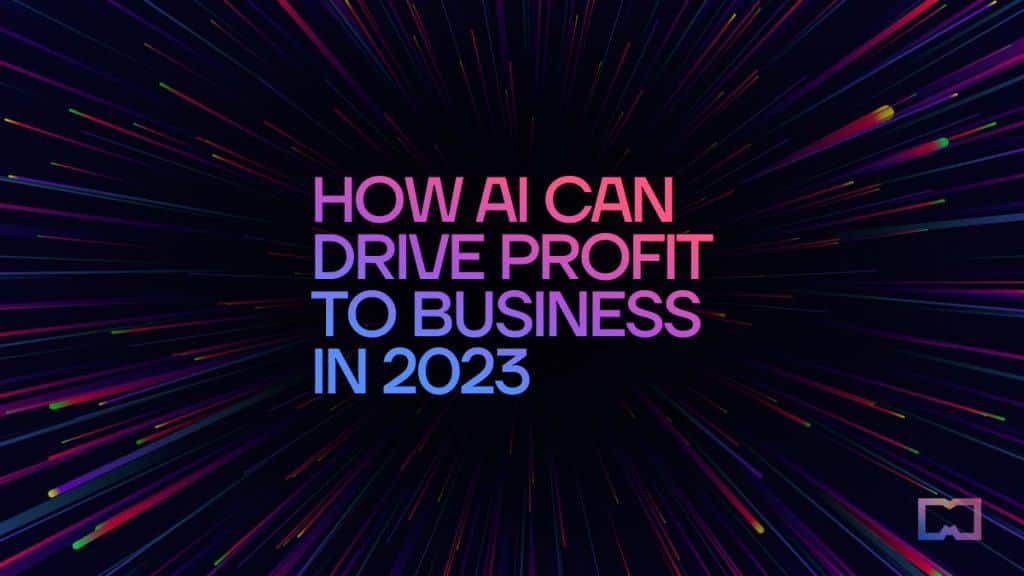How AI Can Drive Profit to Business in 2023


In Brief
This article discovers several AI-powered features that can help drive profit to your business.
Among these are the automation of routine tasks, optimization of processes, enhancement of marketing and sales, enhancement of cybersecurity and fraud detection, predictive analytics and forecasting, data-driven decision-making, and personalization of customer experience.
AI has become a vastly-used powerful tool that offers potential for businesses seeking to drive profits. By leveraging AI technologies available today, companies can unlock new ways for growth, enhance operational efficiency, and deliver personalized customer experiences.

| Pro Tips |
|---|
| 1. Check out these 10+ AI Tools for Social Media that will boost your company’s visibility and help you gain new clients. |
| 2. Try out these 10+ AI-powered Tools for Data Analysts & Data Scientists that will help your business fasten data analysis process. |
| 3. Look at these 10 Free AI Stocks Photos and Images that can help you create promotional content for your business. |
This article discovers several AI-powered tools that can drive profit to your business. We explore the benefits that artificial intelligence brings to the table and cover practical applications across different sectors.
Notably, AI-powered features covered in the article are suitable for startups and established enterprises. The following tools enable organizations of different sectors to grow sustainably and reach financial success.
Automate Routine Tasks

Artificial intelligence can automate mundane and repetitive tasks, reducing human errors and increasing efficiency. For example, such activities might be document processing or data entry. You can check out the ten best AI-powered tools for data analysis here.
By automizing these steps of the processes, the technology allows employees to focus on more value-added activities. The feature can help businesses save time and resources, ultimately leading to cost savings and increased profitability. More than that, automation reduces the chances of errors that can be made by humans when fatigued and distracted.
Automating routine tasks can benefit businesses across various sectors, including data entry in finance, invoice processing in accounting, or order fulfillment in e-commerce.
Error Detector

Artificial intelligence can help entrepreneurs and workers detect errors. The technology can reduce human error as systems can be trained to detect anomalies and errors in real-time. This helps businesses identify and rectify issues before they escalate.
For example, in manufacturing processes, AI-powered computer vision systems can identify products’ defects with high precision and speed. In this case, the technology reduces the chances of human error in quality control. This feature is particularly useful in industries where quality control is crucial, such as pharmaceuticals or food.
Optimize Processes

AI can analyze and optimize complex business processes to identify bottlenecks, inefficiencies, or areas for improvement. By applying machine learning algorithms to process data, businesses can streamline operations and reduce cycle times. In addition, with the help of artificial intelligence, companies can enhance productivity by eliminating redundant steps or optimizing resource allocation.
The technology helps users expedite manual and repetitive work. For instance, according to a McKinsey study, artificial intelligence enables software developers to complete coding tasks twice as fast. AI also enables developers to jump-start the first draft of new code. Practically speaking, artificial intelligence provides code suggestions that help coders escape writer’s block.
Then, with the use of AI, developers can accelerate updates to existing codes. All these features save time and lead programmers to increase their ability to take on new challenges.
Enhance marketing and sales

Artificial intelligence can help businesses enhance marketing and sales. To start, it can analyze large volumes of customer data, social media activity, and browsing behavior. This helps identify potential leads and target customers with relevant and timely marketing messages. In addition, AI-powered predictive models can analyze historical data and market trends to forecast customer behavior, demand patterns, or sales opportunities.
Artificial intelligence-powered algorithms can also optimize advertising campaigns, personalize content, and identify the most effective channels for customer acquisition.
By improving marketing and sales efforts, businesses can attract more customers, increase conversions, and boost profitability.
Enhance cybersecurity and fraud detection

AI can also enhance businesses’ cybersecurity practices and detect fraud. The technology can analyze vast amounts of data to detect anomalies, patterns, and potential risks. For example, AI algorithms analyze network traffic, system logs, and user behavior to identify patterns indicative of potential cyber threats. The technology can also detect suspicious activities, malware, or unauthorized access attempts, enabling proactive threat prevention and timely incident response.
In addition, companies can use AI to integrate intelligent authentication processes, such as biometrics and behavior analysis.
By leveraging AI for risk management and fraud detection, businesses can identify and mitigate risks, prevent fraudulent activities, and minimize losses. This safeguards the company’s financial health and contributes to long-term profitability.
Predictive analytics and forecasting

Businesses can use artificial intelligence to analyze trends. For example, AI can utilize predictive analytics to forecast future trends, demand, and market conditions. By accurately predicting customer needs and market shifts, businesses can make proactive decisions regarding inventory management, supply chain optimization, and resource allocation. This enables companies to meet customer demand more effectively, minimize waste, and seize opportunities, ultimately driving profitability.
These AI-powered features can be particularly useful in such industries as retail, manufacturing, supply chain, and finance.
Data-driven decision making

In businesses, artificial intelligence can help make decisions based on data analysis. AI can analyze large volumes of data quickly and accurately. It can uncover patterns, insights, and trends that humans may miss, enabling businesses to make more informed decisions. By leveraging AI-powered analytics, companies can optimize pricing strategies, identify market opportunities, and improve operational efficiency, resulting in increased profits.
In addition, AI can provide decision-support tools that consider multiple factors, scenarios, and historical data to help human decision-makers make more informed choices. By leveraging AI algorithms, businesses can minimize errors caused by biases, incomplete information, or subjective judgment.
This feature is applicable across industries where complex decision-making is involved, such as finance, healthcare, or logistics.
Personalize customer experience

In business, AI-powered natural language processing tools, such as chatbots and recommendation engines, can dramatically enhance customer experience.
Such chatbots can provide personalized interactions and recommendations, as well as offer tailored support. For instance, AI-powered chatbots can handle customer queries, provide accurate information, and resolve issues, reducing the chances of human errors in customer support and improving response times.
By understanding customer preferences and behavior, businesses can tailor their offerings, marketing messages, and customer service. Such features lead to improved customer satisfaction, loyalty, and increased profits.
Conclusion
Generally speaking, implementing AI requires a strategic approach, careful planning, and appropriate data infrastructure.
Artificial intelligence-powered tools help businesses rapidly grow by automizing and optimizing processes. However, it is still crucial to examine the output such tools generate. Individuals should be aware of the context in which anything is developed and consider specific requirements of tasks completed with the help of AI.
Lastly, artificial intelligence should complement human expertise and decision-making rather than replace it entirely. By leveraging the power of AI in these ways, businesses can drive profit and gain a competitive edge in today’s digital landscape.
Frequently Asked Questions
Yes, you can use AI-powered tools in business. There are several areas where businesses can use artificial intelligence. Some of these are process automation and optimization, marketing and sales, customer relations, predictive analytics, decision support, and cybersecurity.
There are several ways in which AI can help your business grow. First of all, the technology can automate routine tasks and optimize processes. Then, AI can quickly conduct predictive analytics and forecasting and help individuals make data-driven decisions. Lastly, artificial intelligence can provide personalized customer experiencesand enhance marketing and sales.
Artificial intelligence-powered tools provide numerous opportunities for your business to grow and become more profitable. For instance, you can use AI to automate routine tasks, optimize processes, and offer personalized customer experiences.
Read related posts:
Disclaimer
In line with the Trust Project guidelines, please note that the information provided on this page is not intended to be and should not be interpreted as legal, tax, investment, financial, or any other form of advice. It is important to only invest what you can afford to lose and to seek independent financial advice if you have any doubts. For further information, we suggest referring to the terms and conditions as well as the help and support pages provided by the issuer or advertiser. MetaversePost is committed to accurate, unbiased reporting, but market conditions are subject to change without notice.
About The Author
Valeria is a reporter for Metaverse Post. She focuses on fundraises, AI, metaverse, digital fashion, NFTs, and everything web3-related. Valeria has a Master’s degree in Public Communications and is getting her second Major in International Business Management. She dedicates her free time to photography and fashion styling. At the age of 13, Valeria created her first fashion-focused blog, which developed her passion for journalism and style. She is based in northern Italy and often works remotely from different European cities. You can contact her at valerygoncharenko@mpost.io
More articles

Valeria is a reporter for Metaverse Post. She focuses on fundraises, AI, metaverse, digital fashion, NFTs, and everything web3-related. Valeria has a Master’s degree in Public Communications and is getting her second Major in International Business Management. She dedicates her free time to photography and fashion styling. At the age of 13, Valeria created her first fashion-focused blog, which developed her passion for journalism and style. She is based in northern Italy and often works remotely from different European cities. You can contact her at valerygoncharenko@mpost.io























































